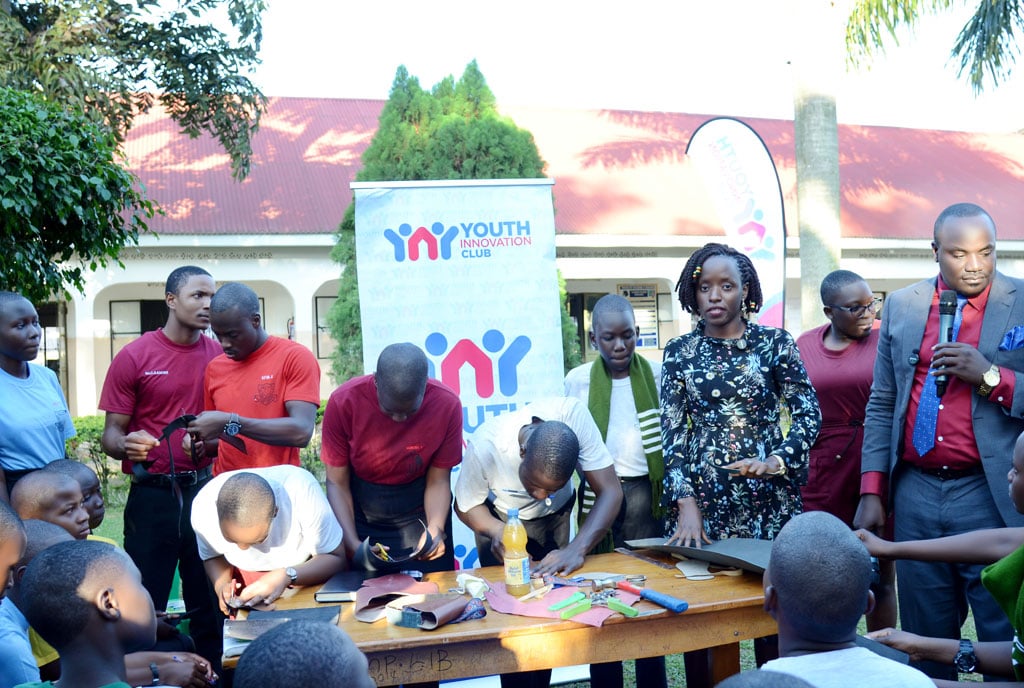Prime
School stuck with 700 chicken raised by O-Level candidates

Mr Isaac Kirenzi, the head teacher of Kojja Senior Secondary School in Mukono District (left), hands over a chicken to Mr Wally Gardiner, the cadre technical officer of Rotary Club of High River, at the school premises in Mukono on Monday. PHOTO/STEPHEN OTAGE
What you need to know:
- While addressing members of the Rotary Club of Kampala Maisha on Monday, Mr Isaac Kirenzi, the head teacher of Kojja SSS in Mukono District, said they need the policy because of the viable enterprises such as chicken and rabbit rearing, jewellery, art and crafts works that were used during the assessment of the competences and skills of students have many products.
Kojja Senior Secondary School has asked government to provide guidelines on how enterprises that emerged during the assessment of candidates for national examinations under the new curriculum should be managed.
While addressing members of the Rotary Club of Kampala Maisha on Monday, Mr Isaac Kirenzi, the head teacher of Kojja SSS in Mukono District, said they need the policy because of the viable enterprises such as chicken and rabbit rearing, jewellery, art and crafts works that were used during the assessment of the competences and skills of students have many products.
“We are wondering whether to start giving the students a pair of rabbits as start-up capital to set up projects at home during vacation.
“We started assessing students in poultry and rabbit raring in 2021. We started with 100 chicken, last year we had 250 and this year we have 700, which we shall sell during Christmas,” he said.
He explained that under the thematic curriculum, candidates are supposed to design and implement projects to acquire skills and competences that constitute 20 percent of the final mark.
Since 2021, the students have reared chicken and rabbits, produced jewellery, art and crafts pieces from which the school now feels it can have a craft shop outside the school gate to sell the items.
On Monday, members of the Rotary Club of Kampala Maisha and the Rotary Club of Frankurt Stadel visited the secondary school and five other primary schools within Ntenjeru Sub-county in Mukono to evaluate the impact of the $220,000 grant that they together with women led community groups received for economic empowerment and improve the water hygiene and sanitation in schools.
Asked how they have been impacted, Mr Kirenzi said when he joined the school in 2020, the school lost more than 20 girls every end of term due to lack of clean water and sanitation facilities.
Since 2021 when the Rotary Club of Maisha built modern toilet facilities at the school, the girls started returning and their retention rates increased because of modern bathrooms and changing rooms they can use during menses.
Asked what they are doing with the products that candidates produce during their assessment during national examinations, Ms Jenniffer Kalule, the Uneb spokesperson, said the exam body noted that if the schools have income-generating projects, they should focus at making them sustainable.
Fund
According to Robert Odedo the project focal person, together with eight Rotary Clubs in Germany, they initiated the Ntenjeru Women’s Empowerment Project in 2020 and it is closing in 2024.
The project covered basic education and literacy, water
and sanitation in the six schools they supported, economic empowerment of 400 women who got financial literacy, vocational skills in shoe making, jewellery wine making, fish processing, liquid soap making, piggery and book binding and as the project winds up, they are taking stock their achievements.



